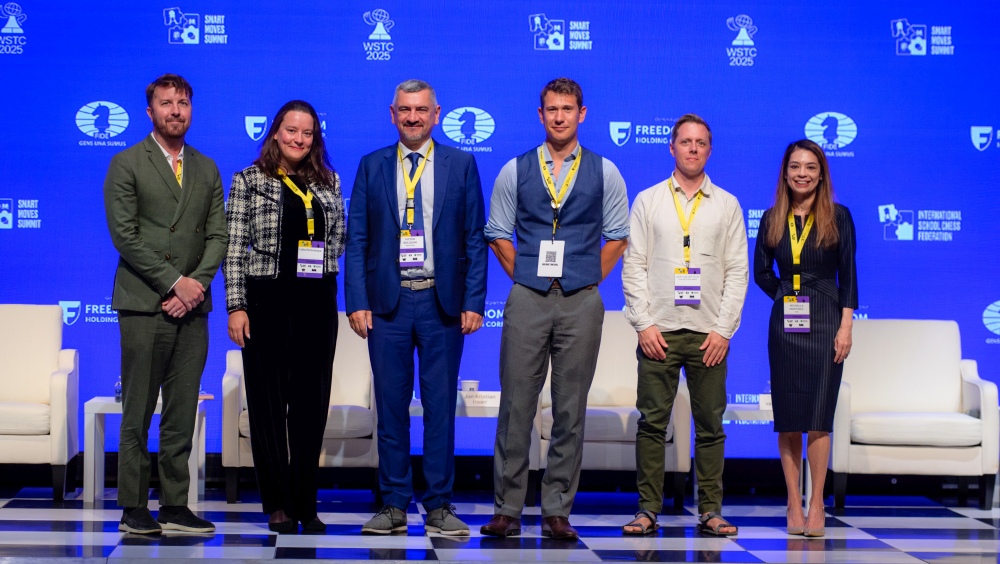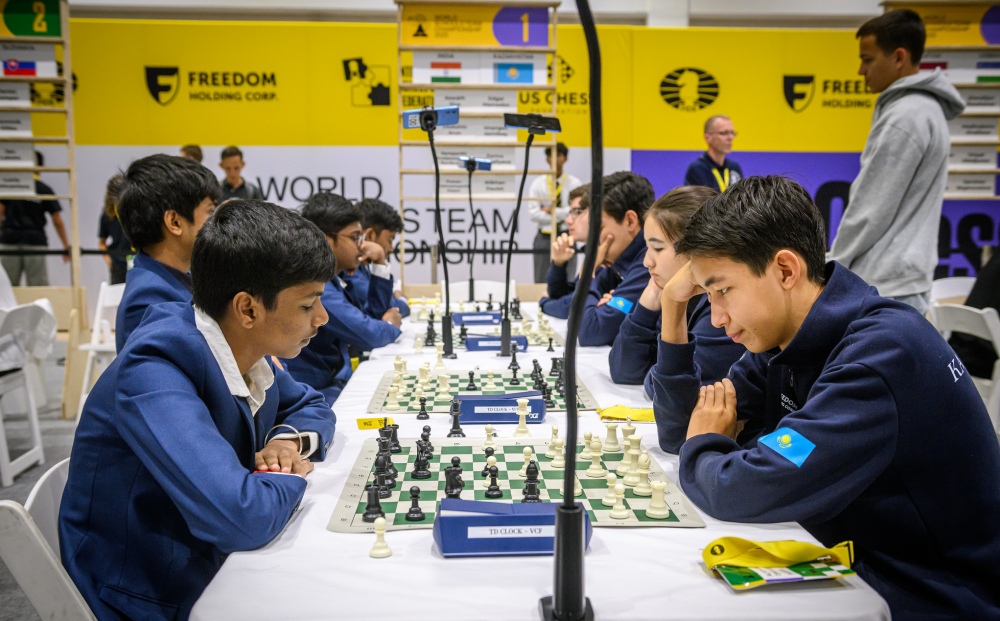Smart Moves Summit sets out global vision for chess in education

The first-ever global conference on the role of chess in education concluded in Washington D.C. today with a call to governments and education institutions to integrate chess into formal and informal learning environments, including schools. Over 50 speakers – including eminent scientists and researchers in the fields of education and cognitive studies, educators, coaches, leaders of state and international chess projects, chess-tech entrepreneurs, government officials and influencers – took part in the two-day event aimed at discussing the educational and cognitive benefits of chess. Organised by FIDE and the International Schools Chess Federation, and sponsored by the NASDAQ-listed Freedom Holding Corporation, the second day of the Smart Moves Summit saw lectures, panel discussions and presentations ranging from real human stories on how chess helped change the lives of people around the world, to building financially viable chess initiatives and private-public partnerships, to how social media is redefining the image of chess. The conference concluded with a declaration, setting the ground for a global effort to get national and international bodies and institutions to formally recognise and include chess in education and social programmes. The declaration calls for the integration of chess “into formal and informal learning environments, including public schools, after-school programmes, and digital platforms”. Steps to be taken include providing teacher training, curriculum framework, and evidence-based support to scale sustainable chess education programs. The signatories of the declaration have committed themselves to expanding access to chess education in underserved communities, addressing gender disparities and ensuring inclusive practices for children with disabilities, refugees and the displaced. True stories of chess changing lives The central panel discussion on the second day of the “Smart Moves Summit” titled “The power of chess to change lives”, offered a compelling look at how the game has transformed the fortunes of people from challenging backgrounds. Dr. Jenny D. Ingber, President & CEO of Chess in the Schools (pictured above), opened the session by recounting the journey of a young student named Eva, who went from a curious beginner to a confident competitor and mentor. Ingber emphasised that for many low-income students, chess serves as a “mirror, a ladder, a doorway” to a better future. “Chess does not care where you’re from, how much money your parents make or what language you speak,” Ingber said, “It only asks, can you think ahead?” Rochelle Ballantyne, a litigation associate and alumna of the Chess in the Schools programme (pictured below), provided her own account of her journey as a low-income Black girl from Brooklyn to a lawyer. She credited her family and Chess in the Schools for her success, while also openly sharing her experiences with racism and exclusion at tournaments. Ballantyne stated that her “pride became a foundation, giving me the strength to push myself in the face of discomfort and adversity.” Kwadwo Acheampong, a Senior VP at PIMCO and another program alumnus, spoke about how chess provided him with structure, confidence, and community as a shy immigrant child in the Bronx, and even influenced his career in finance. Acheampong underscored the lesson that “it’s not often the moves you make that are important, but the moves you don’t make”. He concluded by stating that “chess gave me the platform and the confidence to say, ‘I am a leader’”. A coach and social entrepreneur from Uganda, Robert Katende (pictured below), shared stories of how chess has transformed the lives of youth living in slums and those with disabilities. He detailed the journeys of two people – one who became a national champion and then an engineer, while the other – a disabled player – competed internationally and got to step outside of Uganda thanks to chess. Katende’s philosophy is centred on producing “life champions” rather than just titled players, explaining, “I may not have produced Grandmasters, but I have produced thousands of life champions”. David Heiser (pictured below) and Arlecia Taylor from the Renaissance Knights Chess Foundation and Chicago Public Schools, respectively, highlighted their work in Chicago’s underserved communities. Their initiatives, which range from police-student programmes to mentorships for children, focus on inclusion, healing trauma, and creating opportunities. They described chess as a “great equalizer” and a tool that teaches children that “maybe my next move matters.” How to better market and present chess to the public and the sponsors As chess is increasingly being used in education, one of the conversations emerging is how to better market and present chess and its benefits to a wider population. This was the topic of the “Strategic Partnerships: Sponsorship and Marketing at the Crossroads of Chess and Education” at the Smart Moves Summit. Lidia Perovskaya (pictured above), head of communications for the International Collegiate Programming Contest (ICPC), shared her organisation’s approach to promoting their work. Perovskaya emphasised the importance of the entire community sharing the rewards of the game, so “even if you’re not in the top 10, you would still have plenty of opportunities and become part of the community”. She identified three key categories of partners: academic, corporate, and general brands. She emphasised that partnerships work best when sponsors share the vision of building a community first and foremost. “We are always looking for long-term relationships for meaningful partnerships,” she said, stressing that they seek companies who are “truly invested in a long-term game”. She noted that universities and schools, as academic partners, provide an “instant connection” because they share a core value of seeking talent and ambition in young people. Moldovan Grandmaster and FIDE Executive Director Victor Bologan (pictured above) addressed what he sees as the main problem in modern chess: its fragmentation. He explained that while the chess world has many excellent elements, it lacks a unified ecosystem that brings together online platforms, clubs, organisations, and individuals under one umbrella. To solve this, Bologan is developing Chess ID, a new company aimed at creating a single “window of access” to all chess services for players and partners. Bologan believes this platform will make chess more organised and accessible. He noted the number of FIDE-registered
Velammal MHS School of India pulls ahead at the World Schools Team Championship

Day 3 of the World Schools Team Championship delivered another dose of high-stakes drama and memorable moments, both on and off the board. With two rounds played, the competition intensified as top contenders clashed, and underdogs continued to defy expectations. At the close of the day, India’s Velammal MHS School leads the event, holding strong as the tournament moves toward its final stage. All eyes in Round 5 turned to the top board, where a clash between the first and second seeds took centre stage. Kazakhstan’s National School of Physics and Mathematics faced off against Velammal MHS School in a match that lived up to the hype. With board one ending in a draw, it was the bottom two boards that made the difference; both claimed by the young Indian team, securing them a critical victory in the fight for first place. Meanwhile, Sri Lanka’s Royal College, Colombo continued their amazing run with another upset, this time against Slovakia’s Gymnázium, Grösslingová 18, Bratislava. The final score was 2.5-1.5, with all boards drawing except for board two, where the 1620-rated Sri Lankan player stunned his much higher-rated opponent (rated 2016) with a beautifully played finish. This victory propelled Sri Lanka into joint lead, setting up a highly anticipated Round 6 showdown against India with both teams entering the match on perfect scores. In this top-of-the-table encounter, between Velammal MHS School and Royal College, Colombo the Indian team proved too strong, claiming a convincing 3.5-0.5 victory over with two wins and two draws. The result solidified India’s position at the top of the standings heading into the final rounds. Away from the competition tables, the tournament continues to offer a wide range of activities designed to create a fun and social atmosphere for the players. As mentioned in previous updates, the players’ lounge remains a popular hangout, with its mix of games, beanbags, and chill-out zones. But the fun doesn’t stop there – each day wraps up with group activities, from basketball to nature walks, there are a lot of options for the kids to enjoy and socialize with each other. Today’s end of the day activity included a swanky silent disco – which, if you are older and haven’t heard of or experienced before yet (like me!) it is a party setting where music is played through individual headphones for every person. A wonderful setting for fun and to make new friends! Earlier in the day, and also ahead of the championship, players were treated to an excursion to the US Capitol, offering them the chance to take in some local history and culture. Tomorrow marks the seventh and eighth rounds of the tournament. With tensions mounting, and only one day left to play, the stage is set for an exciting finale that will determine the 2025 World Schools Team Champions. Moment of the day The result from round 5 with Sri Lanka’s Royal College beating the higher seed Slovakia’s Gymnázium, Grösslingová with a critical victory, is an incredible result in itself. But the way the decisive game ended made it even more memorable: White just blundered with 26.Qd4?? And suddenly the white king was in grave danger. Black pounced with 26…Qf3! (26…Nf3 was more accurate, but the move played was both elegant and effective). White tried 27.Nf4, defending the g2-pawn but it failed to 27…Nh3+! 28.Kh1 Nxf4 29.Rg1 Nxg2 30.Qb2 and White resigned, facing imminent checkmate after 30…Nf4+. Top 10 after Round 6 Smart Moves Summit Day two of the Smart Moves Summit focused on how chess connects with business, communication, and education. The day opened with a series of TED-style talks exploring the transformative power of chess, followed by a panel on sponsorships and strategic partnerships at the crossroads of chess and learning. Keynote speakers then discussed how to build sustainable school chess programs, and a roundtable discussion featuring top streamers and chess social media managers explored the growing role of social media, gaming, and online platforms in chess promotion. Alongside the main sessions, masterclasses covered topics such as inclusive environments, fair play through data, and effective training methods. As the summit concludes and the final rounds of chess approach, both the competitive and educational aspects of this event reflect the richness and global reach of the chess world. Written by: Charlize van Zyl Photos: Michal Walusza Official website: worldschoolteam2025.fide.com/

